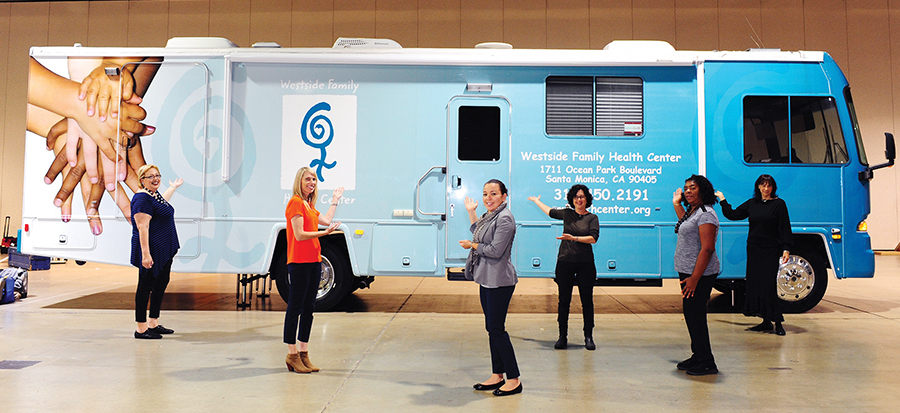By Sue Pascoe
Editor
For most Pacific Palisades households, if an adult is sick or the family’s children are ill, it’s a simple trip to the family doctor or pediatrician. There are no emergency room visits just because the family can’t afford a doctor, or simply doesn’t have insurance.
But what about the nannys, gardeners and housekeepers that work here? For many of them, the Westside Family Health Center (WFHC) provides a safety net, a place to go when they are sick or injured. Everyone who seeks medical care must pay something, but it is done on a sliding scale, and payment can be made over several months.
Palisadian Celia Bernstein, director of development for the center, told the News: “Everyone needs to support this [clinic], even if you never set foot in there.”

That theme of civic engagement is one that Bernstein tackles head on as she works to find funding.
“We encourage people to give to their schools” and various enrichment organizations, she said. “We also need to encourage people to help with the civic infrastructure.”
Bernstein, who has lived in Pacific Palisades with her husband and daughter since 1990, explained that in 2016, the WHFC, located at 1711 Ocean Park Blvd., saw 12,135 patients from 239 zip codes.
“We see people who struggle financially,” Bernstein said. “Some people are working two and three jobs.” Half of the people who come to the clinic have no health insurance and 94 percent live below the federal poverty level.
“When I started, nine out of 10 people didn’t have insurance,” Bernstein said, noting that WFHC executives worry that if the Affordable Care Act is repealed or if federal health programs are defunded, the non- profit could lose 70 percent or more of its government funding.
The center started in 1974 as the Women’s Health Care Project. It was modeled on the Boston Women’s Health Collaborative (now called Our Bodies, Ourselves) and offered women health care. Prenatal care was added in 1990, pediatric services in 1992, adolescent health care in 1994 and a family practice was added in 1999.
Today there are two full-time physicians on staff and seven support staff.
Medical Director Dr. Rebecca Rodriguez is dual board certified in internal medicine and pediatrics, and Dr. Nancy Greep is dual board certified in internal medicine and endocrinology.
Patients who work can make appointments up to 7 p.m. on Tuesday and Wednesday and on Saturday from 8:30 a.m. to 2 p.m. The center is open on some holidays. Although it does not provide dental or mental services, that possibility is being considered.
Bernstein, who graduated from Sarah Lawrence College and received her master’s degree at Columbia, was working as a social worker about the time of the Rodney King trial and L.A. riots.
“I wanted to get out of the office and do more about the community,” she said.
After taking a few years off from work when her daughter was starting high school, Bernstein discovered the Westside Health Center and started working there in 2011.
Her daughter Lena Kesen, while in high school, worked as a Peer Health Education counselor for WFHC. (She’s now with Avodah—Jewish Service Corps—in Brooklyn.)
Back in 1994, the WFHC launched a community outreach and education program, which targets adolescents from 14 to 19 years of age and offers peer health educator training, street outreach, HIV prevention support groups for gay males, childbirth preparation classes, lactation classes and mother-child support groups.
A mobile medical clinic, which visits campuses of public high schools, including Palisades High School, was launched in 2011. The 36-ft.-long vehicle has two exam rooms, a clinician area, small lab, a vaccine freezer and refrigerator and a small waiting room.
In 2016-17, the mobile clinic attended to 377 students (609 visits); 56 were PaliHi students.
WFHC operates on a $5-million annual budget and 14 percent, about $1 million, must be raised annually.
Currently, the WFHC is looking for a 20,000-sq.-ft. building on the Westside, so it can expand to include dental, vision and mental health care. “It’s been hard to find a space,” Bernstein said, noting that landlords are looking for the next tech company, rather than a community health center.
The clinic’s annual fundraiser will be held from 5:30 to 9:30 p.m. on Thursday, Feb. 15, and the public is invited. For more information, visit wfhcenter.org.











You must be logged in to post a comment.